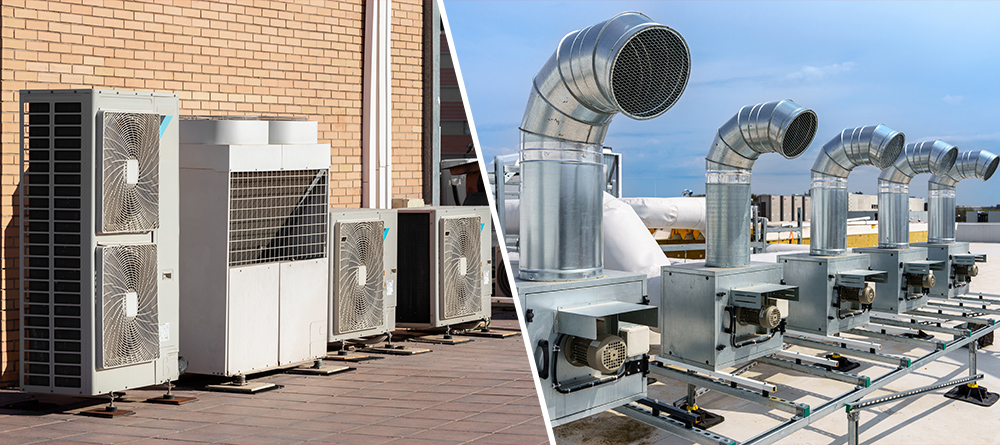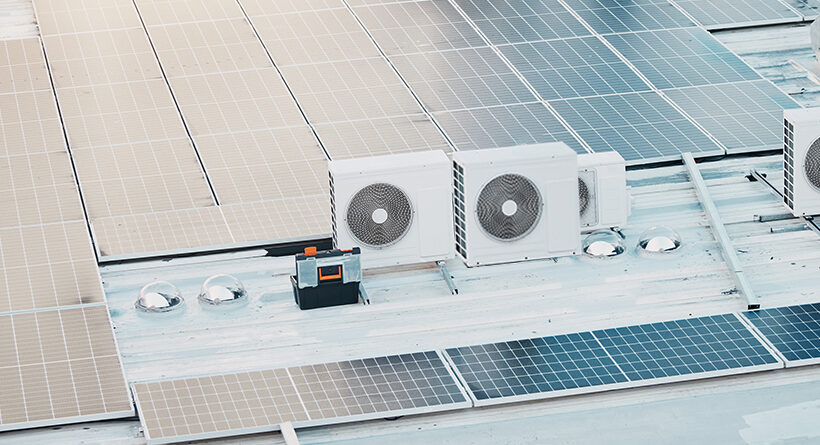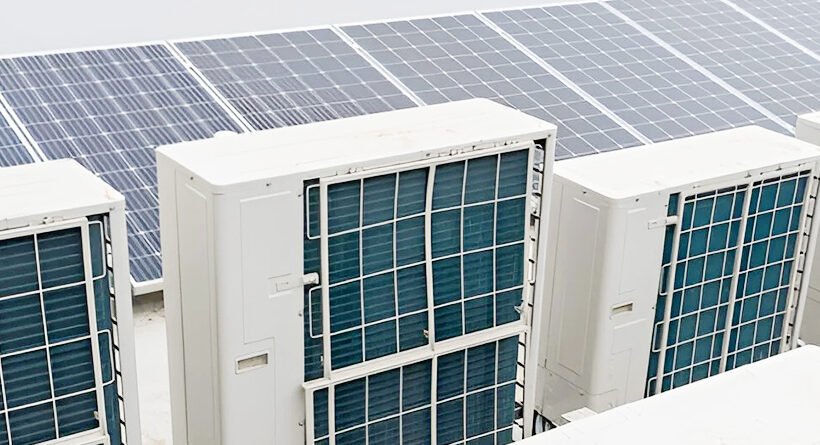Air conditioning plays an important role in keeping people and machines comfortable and efficient. But, not all AC systems are the same, and businesses often get confused between choosing commercial and industrial air conditioning systems.
Both of these types of air conditioning systems cool spaces, but they are designed for very different purposes.
So, if you too are considering getting an air conditioning system, and are unsure as to what type you should choose, this blog is for you. Read on as we explain the main differences between commercial and industrial AC systems and make an informed choice before buying one.
What Is a Commercial AC System?
A commercial AC system is used in places where people work, shop or even visit. These include the following:
- Offices
- Restaurants
- Malls
- Hotels
- Schools
- Hospitals
Commercial systems are designed to keep indoor spaces comfortable for employees and customers. And they focus on air quality, even cooling, and energy efficiency.
Most commercial air conditioning systems are packaged units or split systems that can handle moderate amounts of cooling loads. They also allow for zoning, which essentially means that different rooms or floors can have different temperature settings.
Moving on, let’s take a look at industrial AC systems.
What Is an Industrial AC System?
Industrial air conditioners, as the name suggests, are built for factories, plants and large warehouses. These systems cool not just people, but also machines, equipment and processes that tend to produce heat.
And the main difference between industrial AC systems and commercial AC systems is in their individual power.
Industrial air conditioners are more powerful and durable than their commercial counterparts. They are also designed to run for long hours under harsh conditions. In addition to this, they also come with special requirements like temperature precision, humidity control, or cleanroom air standards.
Some examples of places that use industrial AC systems include:
- Manufacturing plants
- Data centres
- Food processing units
- Pharmaceutical facilities
- Power plants
Now, let’s take a look at the key differences between commercial and industrial AC systems.
Key Differences Between Commercial and Industrial AC Systems
1. Purpose and Function
The primary purpose of a commercial AC is comfort. It makes offices and public areas comfortable for humans.
Industrial AC systems, however, are more concerned with process control and equipment protection. A slight variation in temperature in industries can influence product quality or harm equipment.
2. Cooling Capacity
Commercial systems have a smaller cooling capacity than industrial systems.
But industrial systems are designed to accommodate high heat loads from equipment, chemical processes, or enclosed spaces of large size. They are generally more intricate in nature and also need elaborate installations to control temperature and humidity accurately.
3. System Design
Commercial AC units are frequently roof-mounted or wall-mounted and employ ducting to spread air over floors or rooms.
Industrial systems can consist of chillers, cooling towers, air handling units (AHUs), and process cooling systems. They can be tailor-made according to each facility’s unique requirements.
4. Operation and Maintenance
Commercial AC systems are easier to maintain. Periodic maintenance by a technician is sufficient to keep them in good condition.
Industrial systems require special maintenance and experienced technicians since they have sophisticated machinery. They usually require monitoring and automation systems to provide consistent conditions.
5. Cost
Commercial systems are cheaper to install and upkeep.
On the other hand, industrial systems, with their size, intricacies, and power consumption, entail a higher initial cost. But they are an investment for industries that need consistent temperatures to ensure output quality.
When Should You Choose a Commercial AC System?
You should choose a commercial AC system if your goal is to cool occupied spaces. It’s as simple as that.
These systems are ideal for:
- Offices and retail spaces with steady occupancy
- Hotels and restaurants where comfort matters
- Schools and hospitals that need reliable temperature control
Commercial AC systems are more compact, easier to manage, and energy-efficient for moderate cooling needs.
When Should You Choose an Industrial AC System?
If you need to control the temperature and humidity in your business very precisely, or if your building makes a lot of heat, an industrial AC system might be the best choice.
You need an industrial system if you operate in:
- A manufacturing plant where machines run 24/7
- A data centre where servers must stay cool
- A food processing unit where temperature impacts safety and shelf life
- A chemical or pharmaceutical plant where cooling supports production processes
Industrial systems can handle extreme loads and run continuously without failure. This makes them important for businesses that are process-driven.
How to Choose the Right System for Your Business
Choosing between commercial and industrial AC depends on three main factors:
- Purpose: Is your goal comfort or process control?
- Scale: How large is your space and how much heat does it produce?
- Budget: Can you invest in high-performance equipment and long-term maintenance?
It is best to consult an expert who can assess your building or plant. The expert can then recommend the ideal system to maintain comfort or stability while also cutting down on energy usage and operating costs.
The appropriate system can not only keep users comfortable but can also lower energy bills significantly and operating costs considerably.
Final Thoughts
Although commercial and industrial air conditioning systems may look similar from the outside, their design, function, and purpose differ greatly.
If your business involves people and comfort, go for a commercial system. But, on the other hand, if your operations depend on stable temperature and humidity, choose an industrial system.
Making the right choice ensures long-term performance, lower costs, and a comfortable or controlled environment that supports your business goals.
Looking for reliable cooling solutions for your business?
Choose Nativ Techniks, your trusted partner for smart, efficient, and sustainable air conditioning systems in the Philippines.
FAQs
How does an air conditioning energy audit help save money?
An AC energy audit identifies inefficiencies, detects air leaks, evaluates insulation quality, assesses equipment performance, and provides actionable recommendations to reduce electricity consumption and lower monthly cooling costs significantly.
What are the most effective AC energy-saving tips?
Maintain optimal thermostat settings at 24-26°C, replace dirty filters regularly, seal ductwork leaks, upgrade to energy-efficient models, use programmable thermostats, and ensure proper annual maintenance for maximum savings.
Can regular AC maintenance really reduce energy bills?
Yes, regular AC maintenance improves system efficiency by 15-25%, prevents breakdowns, ensures optimal airflow, maintains refrigerant levels, cleans coils, and extends equipment lifespan while significantly reducing energy consumption costs.
What should I check during an AC energy audit?
Check thermostat accuracy, air filter condition, ductwork sealing, insulation levels, refrigerant charge, electrical connections, airflow rates, cooling capacity, and overall system performance to identify energy-saving opportunities and efficiency improvements.
Is upgrading to a new AC worth the investment?
Upgrading to energy-efficient inverter AC units saves 30-50% on electricity bills, offers better cooling performance, quieter operation, improved air quality, and pays for itself through reduced costs.













Leave a Reply